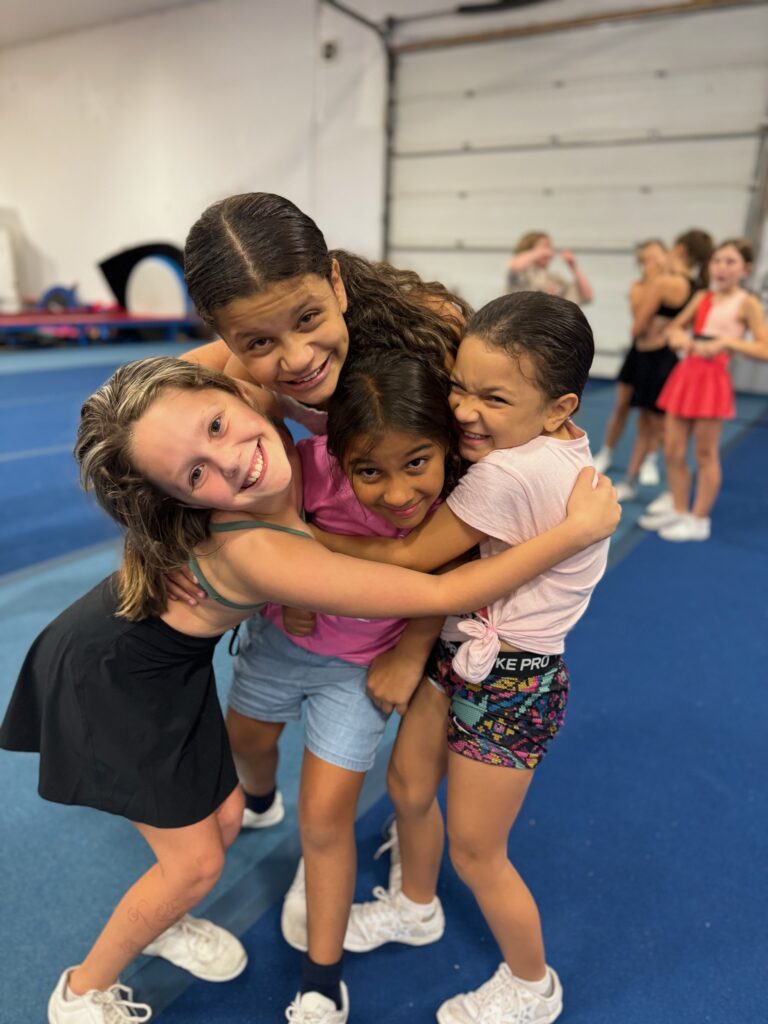Cheerleading has become more than just a sport—it’s a powerful avenue for personal growth and empowerment. For young athletes, the journey through cheerleading builds invaluable life skills, like self-confidence, resilience, and teamwork. Let’s dive into how cheerleading can shape confidence and self-esteem, providing young athletes with tools that last well beyond the mat.

1. Goal Achievement and Skill Mastery
In cheerleading, every skill mastered, whether it’s a new jump, a stunt, or even the timing of a routine, is a tangible accomplishment. Working consistently toward these goals—and seeing progress—provides a steady confidence boost. Young athletes learn that effort leads to improvement, a powerful lesson in self-efficacy. This understanding, that with hard work they can achieve things they once thought impossible, builds confidence from the inside out.
2. Facing Challenges and Building Resilience
Cheerleading isn’t easy. It requires physical stamina, mental strength, and often, the courage to try (and retry) challenging moves. Cheerleaders inevitably face setbacks, like a fall during a stunt or a missed beat in choreography. But each setback is an opportunity to learn, adapt, and try again. This resilience helps young athletes understand that mistakes are part of growth, making them more resilient and better equipped to handle challenges both on and off the mat.
3. Teamwork and Belonging
Being part of a cheer team provides a sense of community and belonging that builds self-esteem. Working with teammates toward a shared goal fosters trust and camaraderie. The support they receive from their teammates boosts their self-worth, while also helping them understand the importance of supporting others. Young cheerleaders gain confidence from knowing they’re valued as part of a team that cares for each other’s success.
4. Body Positivity and Physical Confidence
Cheerleading teaches athletes to be proud of what their bodies can do. Strength, balance, flexibility, and endurance are all necessary for success, and athletes see their own physical abilities improve over time. This helps athletes build a positive self-image and feel confident in their own skin, promoting body positivity and self-acceptance.
5. Performance in Front of an Audience
Performing stunts, cheers, and dances in front of a crowd is a big confidence builder. Standing in front of an audience requires courage, and each successful performance reinforces an athlete’s belief in their own abilities. The experience of performing and receiving positive feedback—from teammates, coaches, and the crowd—builds self-assurance, giving young athletes a strong sense of pride in what they’ve accomplished.
6. Constructive Feedback and Personal Growth
A key part of cheerleading is receiving feedback from coaches, which can sometimes be challenging but is ultimately empowering. Learning to accept feedback and use it to improve fosters a growth mindset. Athletes come to see feedback as a tool for growth, learning that they have the power to develop their skills further. This builds self-esteem rooted in their ability to adapt and improve.
Empowering Beyond the Mat
The confidence and self-esteem cheerleading builds aren’t limited to sports. The lessons young athletes learn—like resilience, teamwork, and the courage to take risks—transfer into school, friendships, and future challenges. Cheerleading is truly transformative, helping young athletes not only believe in themselves but also discover the strength, confidence, and pride that they can carry into every part of their lives.

